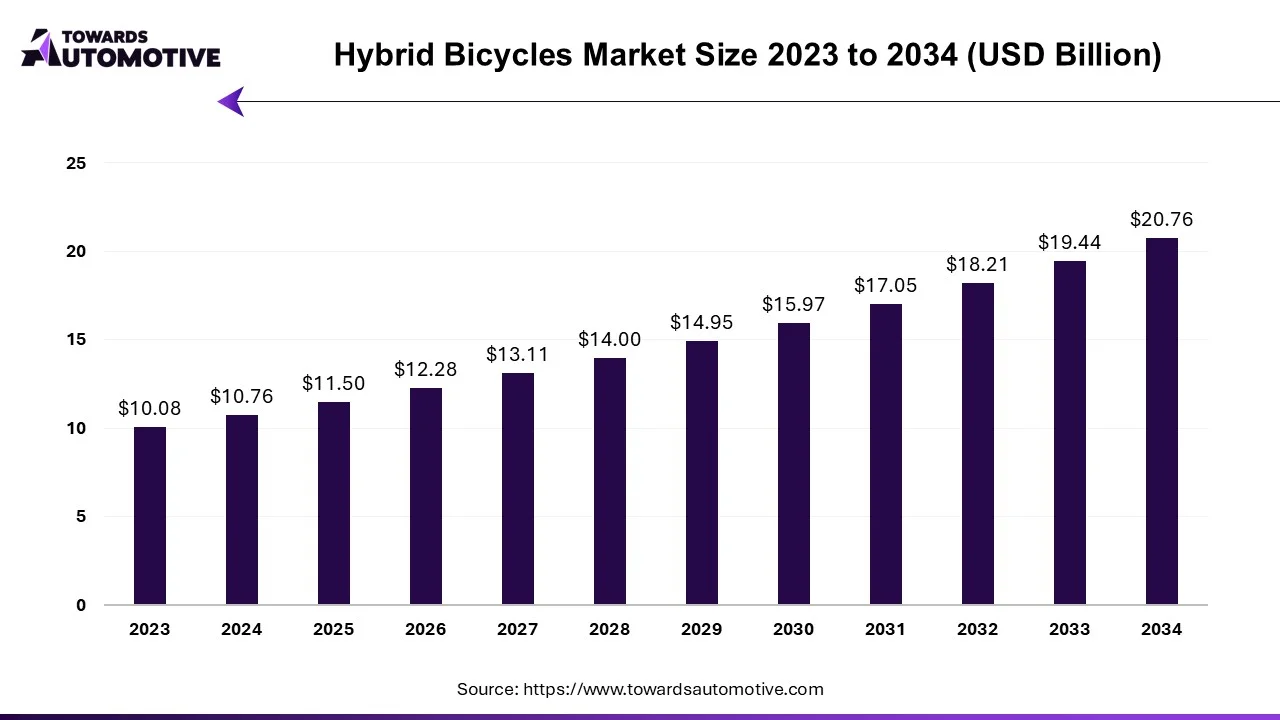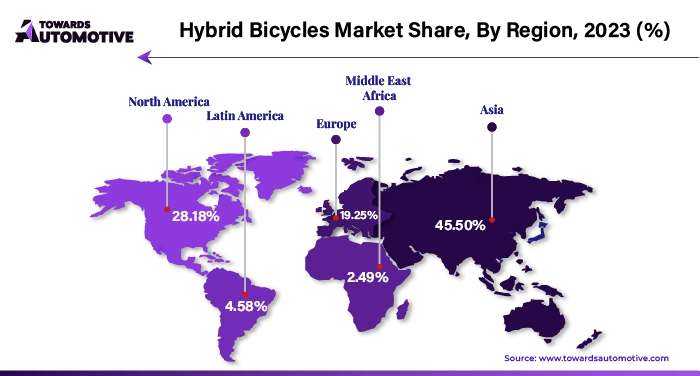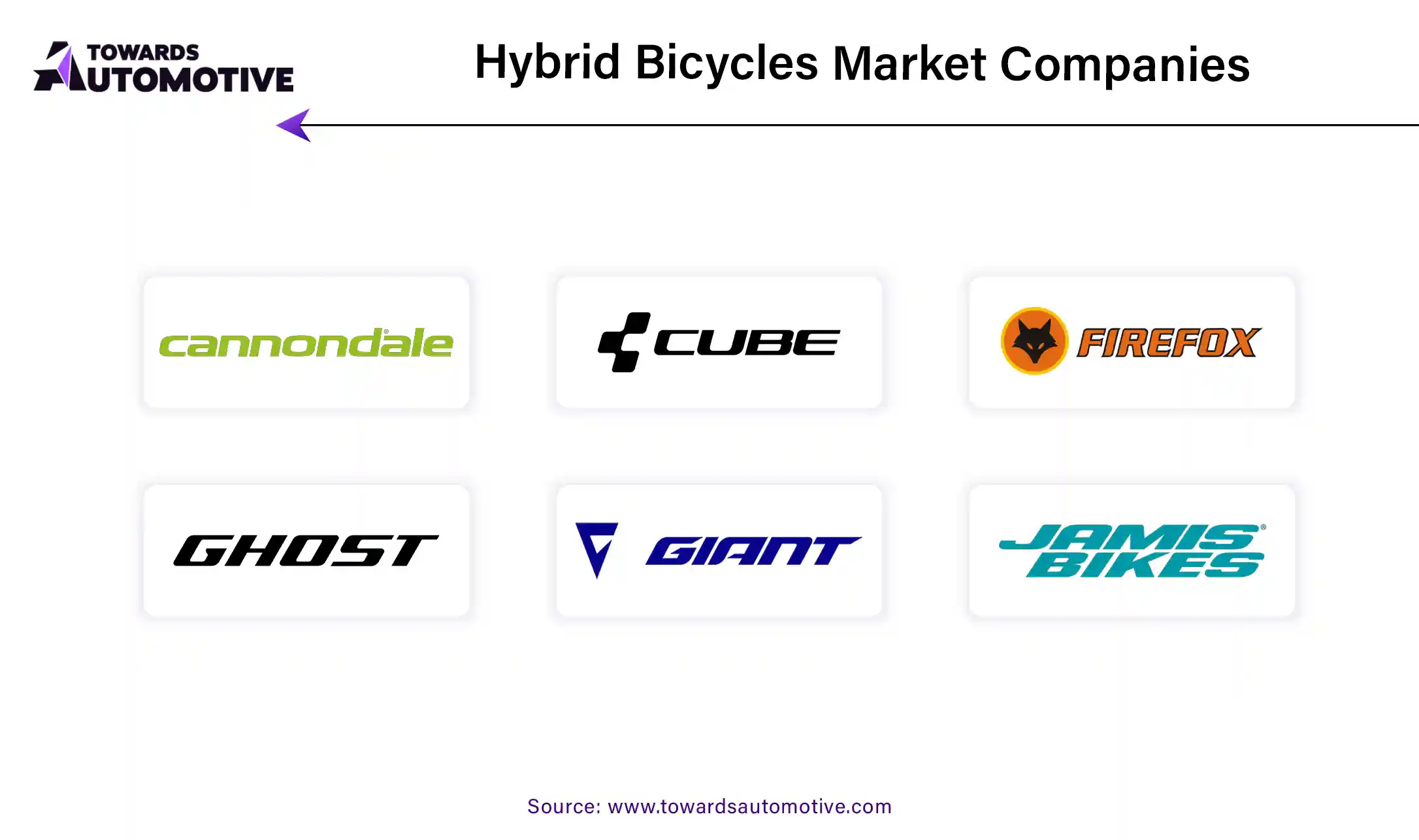April 2025
The hybrid bicycles market is projected to reach USD 20.76 billion by 2034, growing from USD 11.50 billion in 2025, at a CAGR of 6.79% during the forecast period from 2025 to 2034.

Unlock Infinite Advantages: Subscribe to Annual Membership
Hybrid bicycles, also known as cross bikes or fitness bikes, are versatile bicycles designed for a variety of terrains and riding conditions. They blend the features of road bikes and mountain bikes, offering a comfortable riding experience with the ability to handle both paved roads and off-road trails.
The market has witnessed significant growth in recent years, driven by a combination of factors including shifting consumer preferences, technological advancements, and increasing urbanization. Technological advancements, such as lightweight materials and electric-assist systems, have further propelled the market forward, offering consumers improved performance and versatility.
Growing awareness of the interconnectedness between personal health and environmental sustainability has spurred interest in sustainable transportation solutions like hybrid bicycles. As individuals recognize the harmful effects of sedentary lifestyles and carbon emissions, they are increasingly opting for eco-friendly modes of travel. Hybrid bicycles offer a practical and accessible alternative to cars, promoting physical activity while reducing environmental impact. This driver reflects a broader societal shift towards responsible consumer choices and a commitment to fostering a healthier planet for future generations.
Shifting societal norms and evolving lifestyle preferences are reshaping the way people approach transportation and mobility. Factors such as remote work arrangements and a amplified focus on outdoor recreation have led to a growing demand for hybrid bicycles. These versatile vehicles provide a convenient and sustainable means of commuting and leisure travel, aligning with the desire for active and eco-friendly lifestyles. As individuals seek greater flexibility and autonomy in their daily routines, hybrid bicycles emerge as a practical solution that complements modern mobility patterns, driving their increasing popularity in urban and suburban environments alike.
Regions with inadequate cycling infrastructure or unsafe road conditions present significant challenges for potential cyclists and hinder the widespread adoption of hybrid bicycles. Without dedicated bike lanes, cyclists may feel unsafe sharing the road with motor vehicles, leading to reluctance to use hybrid bicycles for commuting or leisure activities. Additionally, the absence of proper parking facilities for bicycles can further discourage individuals from using them as a mode of transportation. Limited infrastructure not only poses safety concerns but also restricts the accessibility and convenience of cycling, inhibiting the growth of the hybrid bicycles market in these regions.
The higher upfront cost of hybrid bicycles compared to traditional bicycles can act as a significant barrier for budget-conscious consumers. While hybrid bicycles offer advanced features and versatility, their premium price point may deter some potential buyers from making a purchase. Despite the long-term benefits of reduced maintenance costs and environmental impact, the perceived value and return on investment may not always justify the initial expense for some individuals. This restraint limits the accessibility of hybrid bicycles to a broader demographic and may hinder market growth.
The surging demand for electric-assist bicycles offers manufacturers a compelling opportunity to drive market growth and innovation. Manufacturers are likely to introduce a diverse range of electric-assist hybrid bicycles equipped with cutting-edge battery technology, extended range capabilities, and enhanced performance features. Moreover, advancements in battery charging technology and lightweight materials contribute to the development of more efficient and agile electric-assist bicycles. With the potential to attract a broader audience, including commuters, leisure riders, and outdoor enthusiasts, the expansion of electric-assist bicycles represents a lucrative opportunity for manufacturers to establish themselves as leaders in the burgeoning electric bicycle market.
Manufacturers have an opportunity to differentiate themselves in the hybrid bicycles market by offering customizable and personalized options to consumers. By providing a wide array of choices for frame styles, colors, components, and accessories, brands can cater to individual preferences and needs, thereby attracting a diverse range of consumers. Customization options allow consumers to create a hybrid bicycle that reflects their unique personality, style, and riding preferences, fostering a deeper sense of connection and ownership. Also, personalized bicycles can serve as a means of self-expression and identity, resonating with consumers who seek products that align with their lifestyle and values. Through implementation of customization and personalization, manufacturers can enhance brand loyalty, increase customer satisfaction, and differentiate themselves in a competitive market landscape, thereby driving sales and fostering long-term relationships with consumers.
Electric bikes have captured a substantial market share of 58.46% primarily driven by the rising interest in sustainable transportation. With growing awareness of climate change and environmental degradation, there's a heightened emphasis on reducing carbon emissions and promoting eco-friendly modes of transportation. Electric bikes offer a sustainable alternative to traditional vehicles, producing zero emissions during operation and helping to mitigate air pollution and greenhouse gas emissions. Also, electric bikes enable individuals to incorporate physical activity into their daily routines, even for those who may have physical limitations or face challenges with traditional cycling.

Urban commuting segment dominated the market with share of 42.80% and is expected to grow at a CAGR of 6.56% from 2024 to 2033. This is owing to the various challenges inherent in city transportation and the eco-friendly attributes of hybrid bikes. Urban areas often grapple with heavy traffic congestion, resulting in long commute times and increased frustration among commuters. Hybrid bikes offer a nimble and efficient means of navigating through congested streets, enabling commuters to bypass traffic jams and arrive at their destinations more quickly.
Asia Pacific dominated the global hybrid bicycles market with 45.50% of the share of the total market in 2023 and is likely to continue the same trend during the forecast period. Economic growth in the region has led to an increase in disposable income and purchasing power, particularly among the middle class. As a result, there is a growing demand for consumer goods and recreational activities, including bicycles. Hybrid bicycles appeal to consumers looking for a versatile and affordable mode of transportation, making them increasingly popular among urban commuters and recreational riders in the region.

North America is likely to grow at substantial CAGR of 6.56% in the hybrid bicycles market during the forecast period. Many cities in North America are investing in cycling infrastructure, including dedicated bike lanes, bike-sharing programs, and bike-friendly policies. The development of cycling infrastructure makes it safer and more convenient for individuals to commute by bicycle, encouraging more people to consider hybrid bicycles as a viable transportation option.

Some of the key players in hybrid bicycles market are Cannodale Bicycle Corporation, Cube Bikes, Avon Cycles Limited, Diamondback, Firefox Bikes, Ghost Bikes, Giant Bicycles Inc., Fuji Bikes, Jamis Bikes, Merida Industry Co., Ltd., Marin Bikes, Orbea Bicycles, Scott Sports SA, Specialized Bicycle Components Inc., and Trek Bicycle Corporation, among others.
By Technology
By Product
By Application
By End User
By Region
April 2025
April 2025
April 2025
April 2025
We offer automotive expertise for market projections and customizable research, adaptable to diverse strategic approaches.
Contact Us